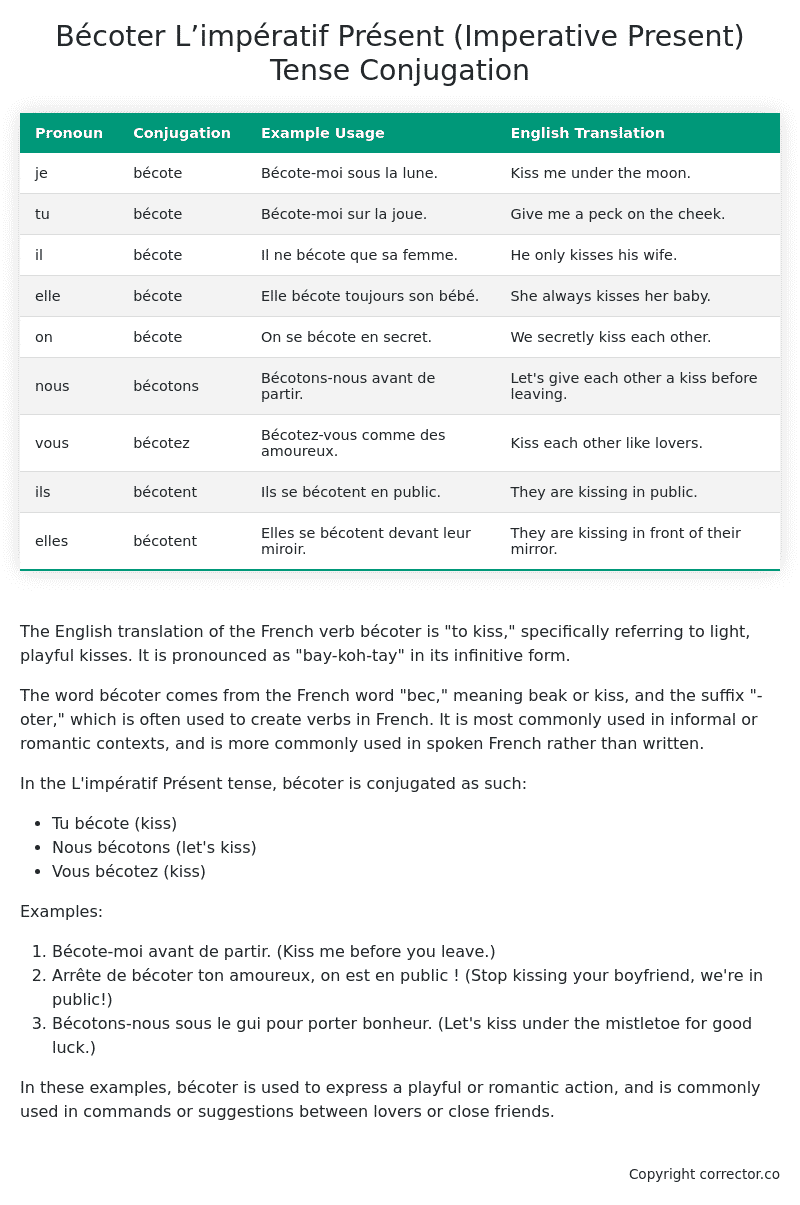L’impératif Présent (Imperative Present) Tense Conjugation of the French Verb bécoter
Introduction to the verb bécoter
The English translation of the French verb bécoter is “to kiss,” specifically referring to light, playful kisses. It is pronounced as “bay-koh-tay” in its infinitive form.
The word bécoter comes from the French word “bec,” meaning beak or kiss, and the suffix “-oter,” which is often used to create verbs in French. It is most commonly used in informal or romantic contexts, and is more commonly used in spoken French rather than written.
In the L’impératif Présent tense, bécoter is conjugated as such:
- Tu bécote (kiss)
- Nous bécotons (let’s kiss)
- Vous bécotez (kiss)
Examples:
- Bécote-moi avant de partir. (Kiss me before you leave.)
- Arrête de bécoter ton amoureux, on est en public ! (Stop kissing your boyfriend, we’re in public!)
- Bécotons-nous sous le gui pour porter bonheur. (Let’s kiss under the mistletoe for good luck.)
In these examples, bécoter is used to express a playful or romantic action, and is commonly used in commands or suggestions between lovers or close friends.
Table of the L’impératif Présent (Imperative Present) Tense Conjugation of bécoter
| Pronoun | Conjugation | Example Usage | English Translation |
|---|---|---|---|
| je | bécote | Bécote-moi sous la lune. | Kiss me under the moon. |
| tu | bécote | Bécote-moi sur la joue. | Give me a peck on the cheek. |
| il | bécote | Il ne bécote que sa femme. | He only kisses his wife. |
| elle | bécote | Elle bécote toujours son bébé. | She always kisses her baby. |
| on | bécote | On se bécote en secret. | We secretly kiss each other. |
| nous | bécotons | Bécotons-nous avant de partir. | Let’s give each other a kiss before leaving. |
| vous | bécotez | Bécotez-vous comme des amoureux. | Kiss each other like lovers. |
| ils | bécotent | Ils se bécotent en public. | They are kissing in public. |
| elles | bécotent | Elles se bécotent devant leur miroir. | They are kissing in front of their mirror. |
Other Conjugations for Bécoter.
Le Present (Present Tense) Conjugation of the French Verb bécoter
Imparfait (Imperfect) Tense Conjugation of the French Verb bécoter
Passé Simple (Simple Past) Tense Conjugation of the French Verb bécoter
Passé Composé (Present Perfect) Tense Conjugation of the French Verb bécoter
Futur Simple (Simple Future) Tense Conjugation of the French Verb bécoter
Futur Proche (Near Future) Tense Conjugation of the French Verb bécoter
Plus-que-parfait (Pluperfect) Tense Conjugation of the French Verb bécoter
Passé Antérieur (Past Anterior) Tense Conjugation of the French Verb bécoter
Futur Antérieur (Future Anterior) Tense Conjugation of the French Verb bécoter
Subjonctif Présent (Subjunctive Present) Tense Conjugation of the French Verb bécoter
Subjonctif Passé (Subjunctive Past) Tense Conjugation of the French Verb bécoter
Subjonctif Imparfait (Subjunctive Imperfect) Tense Conjugation of the French Verb bécoter
Subjonctif Plus-que-parfait (Subjunctive Pluperfect) Tense Conjugation of the French Verb bécoter
Conditionnel Présent (Conditional Present) Tense Conjugation of the French Verb bécoter
Conditionnel Passé (Conditional Past) Tense Conjugation of the French Verb bécoter
L’impératif Présent (Imperative Present) Tense Conjugation of the French Verb bécoter (this article)
L’infinitif Présent (Infinitive Present) Tense Conjugation of the French Verb bécoter
Struggling with French verbs or the language in general? Why not use our free French Grammar Checker – no registration required!
Get a FREE Download Study Sheet of this Conjugation 🔥
Simply right click the image below, click “save image” and get your free reference for the bécoter L’impératif Présent tense conjugation!

Bécoter – About the French L’impératif Présent (Imperative Present) Tense
Usage
Giving commands
Making requests
Offering advice
Expressing desires
Conjugation Formation
Interactions with other tenses
Want More?
I hope you enjoyed this article on the verb bécoter. Still in a learning mood? Check out another TOTALLY random French verb conjugation!


